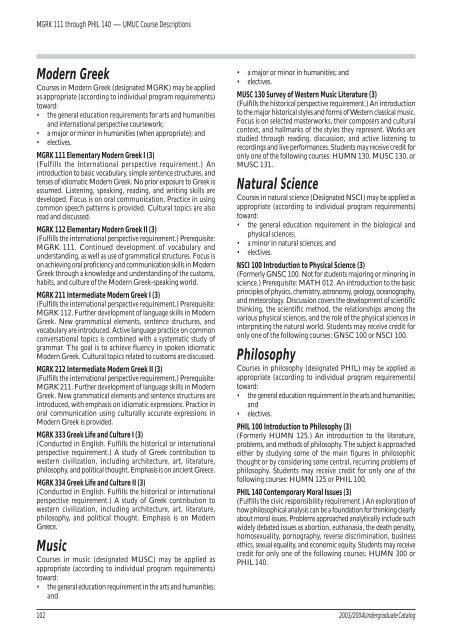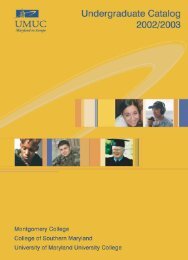Undergraduate - UMUC Europe
Undergraduate - UMUC Europe
Undergraduate - UMUC Europe
You also want an ePaper? Increase the reach of your titles
YUMPU automatically turns print PDFs into web optimized ePapers that Google loves.
MGRK 111 through PHIL 140 — <strong>UMUC</strong> Course Descriptions<br />
Modern Greek<br />
Courses in Modern Greek (designated MGRK) may be applied<br />
as appropriate (according to individual program requirements)<br />
toward:<br />
the general education requirements for arts and humanities<br />
and international perspective coursework;<br />
a major or minor in humanities (when appropriate); and<br />
electives.<br />
MGRK 111 Elementary Modern Greek I (3)<br />
(Fulfills the international perspective requirement.) An<br />
introduction to basic vocabulary, simple sentence structures, and<br />
tenses of idiomatic Modern Greek. No prior exposure to Greek is<br />
assumed. Listening, speaking, reading, and writing skills are<br />
developed. Focus is on oral communication. Practice in using<br />
common speech patterns is provided. Cultural topics are also<br />
read and discussed.<br />
MGRK 112 Elementary Modern Greek II (3)<br />
(Fulfills the international perspective requirement.) Prerequisite:<br />
MGRK 111. Continued development of vocabulary and<br />
understanding, as well as use of grammatical structures. Focus is<br />
on achieving oral proficiency and communication skills in Modern<br />
Greek through a knowledge and understanding of the customs,<br />
habits, and culture of the Modern Greek-speaking world.<br />
MGRK 211 Intermediate Modern Greek I (3)<br />
(Fulfills the international perspective requirement.) Prerequisite:<br />
MGRK 112. Further development of language skills in Modern<br />
Greek. New grammatical elements, sentence structures, and<br />
vocabulary are introduced. Active language practice on common<br />
conversational topics is combined with a systematic study of<br />
grammar. The goal is to achieve fluency in spoken idiomatic<br />
Modern Greek. Cultural topics related to customs are discussed.<br />
MGRK 212 Intermediate Modern Greek II (3)<br />
(Fulfills the international perspective requirement.) Prerequisite:<br />
MGRK 211. Further development of language skills in Modern<br />
Greek. New grammatical elements and sentence structures are<br />
introduced, with emphasis on idiomatic expressions. Practice in<br />
oral communication using culturally accurate expressions in<br />
Modern Greek is provided.<br />
MGRK 333 Greek Life and Culture I (3)<br />
(Conducted in English. Fulfills the historical or international<br />
perspective requirement.) A study of Greek contribution to<br />
western civilization, including architecture, art, literature,<br />
philosophy, and political thought. Emphasis is on ancient Greece.<br />
MGRK 334 Greek Life and Culture II (3)<br />
(Conducted in English. Fulfills the historical or international<br />
perspective requirement.) A study of Greek contribution to<br />
western civilization, including architecture, art, literature,<br />
philosophy, and political thought. Emphasis is on Modern<br />
Greece.<br />
Music<br />
Courses in music (designated MUSC) may be applied as<br />
appropriate (according to individual program requirements)<br />
toward:<br />
the general education requirement in the arts and humanities;<br />
and<br />
102<br />
a major or minor in humanities; and<br />
electives.<br />
MUSC 130 Survey of Western Music Literature (3)<br />
(Fulfills the historical perspective requirement.) An introduction<br />
to the major historical styles and forms of Western classical music.<br />
Focus is on selected masterworks, their composers and cultural<br />
context, and hallmarks of the styles they represent. Works are<br />
studied through reading, discussion, and active listening to<br />
recordings and live performances. Students may receive credit for<br />
only one of the following courses: HUMN 130, MUSC 130, or<br />
MUSC 131.<br />
Natural Science<br />
Courses in natural science (Designated NSCI) may be applied as<br />
appropriate (according to individual program requirements)<br />
toward:<br />
the general education requirement in the biological and<br />
physical sciences;<br />
a minor in natural sciences; and<br />
electives.<br />
NSCI 100 Introduction to Physical Science (3)<br />
(Formerly GNSC 100. Not for students majoring or minoring in<br />
science.) Prerequisite: MATH 012. An introduction to the basic<br />
principles of physics, chemistry, astronomy, geology, oceanography,<br />
and meteorology. Discussion covers the development of scientific<br />
thinking, the scientific method, the relationships among the<br />
various physical sciences, and the role of the physical sciences in<br />
interpreting the natural world. Students may receive credit for<br />
only one of the following courses: GNSC 100 or NSCI 100.<br />
Philosophy<br />
Courses in philosophy (designated PHIL) may be applied as<br />
appropriate (according to individual program requirements)<br />
toward:<br />
the general education requirement in the arts and humanities;<br />
and<br />
electives.<br />
PHIL 100 Introduction to Philosophy (3)<br />
(Formerly HUMN 125.) An introduction to the literature,<br />
problems, and methods of philosophy. The subject is approached<br />
either by studying some of the main figures in philosophic<br />
thought or by considering some central, recurring problems of<br />
philosophy. Students may receive credit for only one of the<br />
following courses: HUMN 125 or PHIL 100.<br />
PHIL 140 Contemporary Moral Issues (3)<br />
(Fulfills the civic responsibility requirement.) An exploration of<br />
how philosophical analysis can be a foundation for thinking clearly<br />
about moral issues. Problems approached analytically include such<br />
widely debated issues as abortion, euthanasia, the death penalty,<br />
homosexuality, pornography, reverse discrimination, business<br />
ethics, sexual equality, and economic equity. Students may receive<br />
credit for only one of the following courses: HUMN 300 or<br />
PHIL 140.<br />
2003/2004<strong>Undergraduate</strong> Catalog






